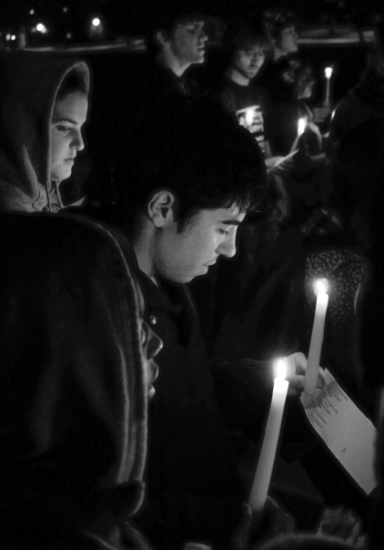
Photo by Hadley Brooks
The annual Matthew Shepard vigil took place on the evening of October 11. Dozens of students stood in Ad Astra Garden around the sundial, each holding a candle in remembrance not only of Shepard, a twenty-one year old college student who was killed in a hate crime twelve years ago, but for the many gay, lesbian, bisexual and transgender people who have experienced discrimination or violence in the United States. The gathering, while not as large as some in the past, was still important and in many ways utterly necessary in light of recent events.
This year’s vigil came at a particularly sensitive moment for the LGBTQ community; Rutgers University student Tyler Clementi, an open homosexual, committed suicide on September 22, 2010, after his roommate streamed a sexual encounter between Clementi and another man onto a live internet feed.
As if this wasn’t devastating enough, this is the fourth suicide committed by a gay teen in the United States this month. The others include thirteen-year old Asher Brown, fifteen-year old Billy Lucas, and thirteen-year old Seth Walsh. Each of these suicides was brought on by incessant bullying based on the sexual orientation of the victims.
Members of Spectrum, one of Conn’s major student clubs designed to combat homophobia, were present. The initial atmosphere was a kind of light-hearted tenseness; students chuckled nervously as they recognized the arrival of friends and speakers, including Sarah Kosofsky ’12, Karina Del Carmen Hernandez ’14 and Amber Villanueva Pittmann ’14.
As the first speaker, Kosofsky, stood on the bench of the sundial and began her speech, the light-heartedness all but evaporated – the mood became grave and attentive. Kosfosky started off by describing herself. She made a brief point of identifying herself as a lesbian last, explaining that even today people still tend to judge the subsequently-heard qualities of an open homosexual with a certain bias.
Hernandez’s speech was more of a brief story of her life, a life plagued by an intolerance of her homosexuality that was hardly restricted to school alone. She described the troubles and frequent clashes with her family that came as a result of her sexual identity.
“Keeping my sexuality a secret felt like water-boarding, with gallons of water being forced down my nostrils and throat. I tried looking in the Bible for something that would make my mother love me because I knew that to come out to her would be to purchase my ticket to hell,” she said.
Despite this, Hernandez buckled and at age twelve came out to her mother. The reaction was as negative as she had anticipated. After her mother told her why God would hate her for being gay, Karina soon found herself forced back into the closet she had just gathered the courage to emerge from.
“What else could a scared twelve year old say?” Hernandez said. Here and there, however, her clever quips kept the mood relatively light. She told the story of her first kiss with another girl in high school, and overhearing students gossiping about it while she was in the bathroom stall.
“I could have sworn I was in the gay version of Mean Girls,” she joked.
Amber Villanueva Pittmann, although heterosexual, has still experienced a great deal of tragedy due to discrimination against gays. Her grandmother, a lesbian, was killed at age fifty-five along with her partner in a violent hate crime committed by her own neighbor.
“When he killed her, he told the police that it had to be done, like she was an animal that was sick and there was no cure for her,” she said. Pittmann never met her grandmother, but heard stories about her when she was growing up.
“I learned how she started an organization in Michigan called Affirmations that helped to encourage young people and others who need a support system to come out,” she said. “It’s amazing to me that was still have this problem eighteen years later, that people still don’t accept and support each other, that society continues to have violence against gays and lesbians.”
After a few more speakers described their experiences, some positive and some negative, the candles held by the students were lit one by one. Following this brief ceremony, papers were passed around containing the lyrics to “Amazing Grace.” While there weren’t enough for each student, they all shared, or sang from memory.
When the singing ended, there was only solemn, ponderous silence. The air was hushed save for the distant chirping of crickets and the eyes of several students glistened with moisture in the candlelight. After a few minutes, students blew out their candles and slowly began to disperse.
Some stayed longer than others; the speakers gave and received hugs from friends and companions, pat each other’s backs and complimented their bravery. The somber atmosphere gradually lifted and was replaced by one of remembrance and respect: remembrance for those whose lives were cut short due to bigotry and respect for those who had weathered various nightmares at the hands of ignorance and intolerance.
“This violent behavior must stop,” Pittmann said. “Do we have to have even more people die to make the world more accepting?” •









